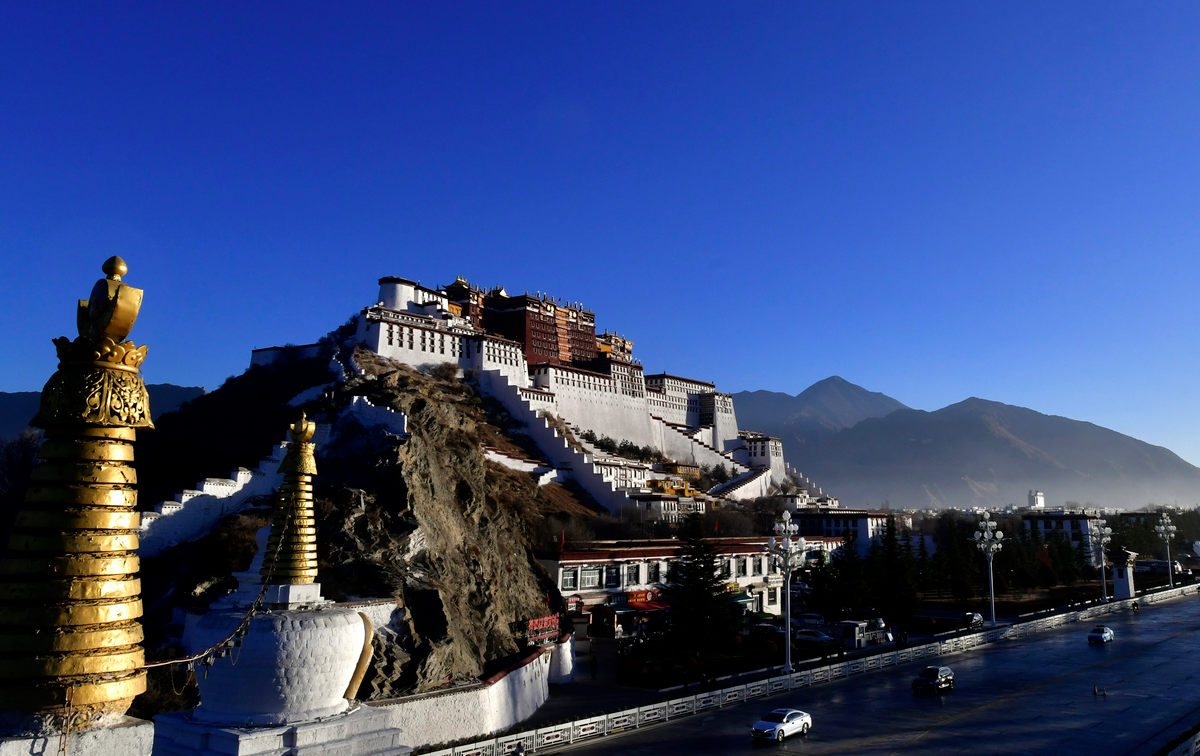Central government approval is fundamental principle, legal safeguard of Grand Living Buddha reincarnation: signed article

The picture shows the Potala Palace in Lhasa, at dawn. (CNS)
The following is a signed article by Li Hui, assistant researcher at the College of Philosophy, Nankai University, presenting his views on the Reincarnation of the Grand Living Buddhas.
In the Tibetan Buddhist reincarnation system, the three fundamental principles of "search within the Chinese territory, drawing lots from the golden urn, and approval from the central government" form a comprehensive and rigorous framework for succession. This system serves as a vital safeguard for national unity, ethnic solidarity, and the proper order of Tibetan Buddhism. Among these principles, "approval by the central government" is the system's ultimate and most essential step. Far from being a mere administrative formality, it carries profound historical logic, legal foundation, and practical significance. This principle is essential for ensuring an orderly reincarnation process, as well as for maintaining social stability and enduring peace.
Central Government Approval as a Vital Manifestation of National Sovereignty
Religious affairs constitute an integral part of state governance, and the management of Tibetan Buddhism affairs is a key responsibility of the central government. From a political perspective, the principle of "central government approval" specifies the national character of reincarnation, incorporating religious matters into the state governance framework. In history, successive central governments of China have managed reincarnation affairs through measures such as conferring titles on influential Living Buddhas and establishing regulatory mechanisms.
In 1793, the Qing government promulgated the "Imperially Approved Ordinance for Better Governance of Tibet (29-Article Ordinance)," with its first article explicitly stipulating that the reincarnation of Living Buddhas had to follow the procedure of "drawing lots from the golden urn," and affirming the central government's approval authority over the reincarnation. In 1936, the government of the Republic of China issued the "Regulations on Lama Reincarnation," mandating that the reincarnation of grand Living Buddhas must be reported to the central government before proceeding with historical conventions, traditional religious ritual search, the lot-drawing ceremony, and the final approval by the central government.
Following the founding of the People's Republic of China, the reincarnation of Tibetan Buddhism Living Buddhas has been managed by governments at various levels in accordance with the law. In 1959, the democratic reform abolished the feudal serfdom under theocracy in Xizang, liberating the reincarnation institution and ushering in a new era. Since 1949, the state has successfully overseen the reincarnations of several prominent Living Buddhas, including the 16th Living Buddha Karmapa, the 10th Panchen Erdeni, and the sixth Regent Reting Rinpoche. By 2024, 93 newly reincarnated Living Buddhas had been confirmed upon government approval.
Central Government Approval as a Prerequisite for Safeguarding National Unity and Social Stability
Xizang is an inseparable part of China's territory, and the Living Buddha reincarnation system, as a unique succession method in Tibetan Buddhism, is vital for national security and social stability. Allowing local or foreign forces to interfere in reincarnation affairs would pose an immediate threat to China's national unity. The central government's confirmation of the reincarnation fundamentally ensures that the reincarnation process remains within the legal and policy framework of the nation, preventing any attempts to exploit the system to split the country or undermine ethnic unity.
Moreover, central government approval reflects the Chinese government's commitment to implementing the policy of freedom of religious belief.
Central Government Approval as a Legal Declaration of the Governance of Religious Affairs in a Modern State
Every country, throughout history and across different regions, without exception, manages its religious affairs in accordance with the law. Currently, affairs related to the reincarnation of Living Buddhas are being carried out in accordance with China's laws and regulations.
The Regulations on Religious Affairs have clarified in legal form the approval authority for the reincarnation of Living Buddhas in Tibetan Buddhism. It stipulates that the succession of Living Buddhas in Tibetan Buddhism, under the guidance of Buddhist organizations, must be conducted in accordance with religious rituals and historical conventions, and must be reported to and approved by the religious affairs department of the people's government at the provincial level or above, or by the people's government at the provincial level or above.
Article 9 of the Measures on the Management of the Reincarnation of Living Buddhas in Tibetan Buddhism stipulates that after the recognition of the reincarnation of the Living Buddhas, the case must be reported to and approved by the religious affairs department of the people's government at the provincial or autonomous region level. For those with significant influence within the Buddhist community, approval must be obtained from the people's government of the province or autonomous region. For those with major influence, approval must be obtained from the National Religious Affairs Administration. For those with particularly major influence, approval must be obtained from the State Council.
Reincarnated Living Buddhas approved by the religious affairs department of the people's government of a province or autonomous region, or by the people's government of a province or autonomous region, must be filed with the National Religious Affairs Administration.
Over the course of the years, the Dalai group has continuously advocated "Tibetan independence," attempting to negate the central government's decisive authority over the reincarnation of Living Buddhas. Through legal provisions and institutional design, the central government has clearly established the irreversible procedures for the reincarnation of Living Buddhas, namely searching within the Chinese territory, drawing lots from the golden urn, and approval from the central government. This has fundamentally eliminated the room for separatist forces to manipulate religious affairs. (Xinhua)
Editor: David

